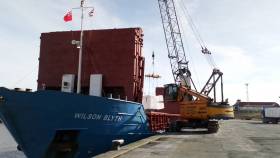Displaying items by tag: New Japanese Customer
Irish Sea Port of Silloth Handles Wood-Pulp from South America for New Japanese Customer
#ports - The Irish Sea Port of Silloth operated by Associated British Ports (ABP) has handled the first delivery of wood pulp for its new Japanese customer.
According to ABP, the Futamura Group manufacture cellulose and polymeric films for the packaging industry who have a major production site in Cumbria where the north-west English port is located.
Wilson Blyth (see Dun Laoghaire call) delivered the 2,500 tonne wood pulp to Silloth, having loaded the import in South America. The cargo will be transported to the company’s production site in Wigton, Cumbria, which employs around 270 people. The wood pulp will be used to make packaging films for foodstuffs such as sweets, tea, coffee and snack products.
Carl Bevan, ABP Divisional Port Manager – North West, said: “We’re delighted to welcome Futamura Group as a new customer at our Port of Silloth and look forward to working together to support a prosperous future for the Cumbrian economy.”
Tom Ismay, Procurement Manager at Furtamura, said: “It has been a very smooth transition working with ABP and we are glad that our local infrastructure means we can easily bring goods in via such a convenient port. One bulk ship has taken approximately 200 lorry loads off the road. Sustainability is important to Futamura and we are working hard to make changes where we can."
























































